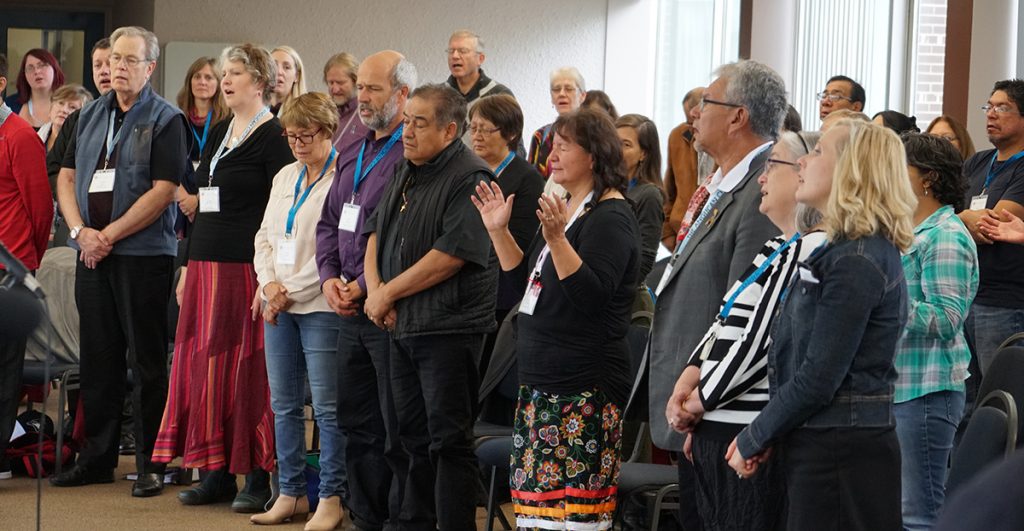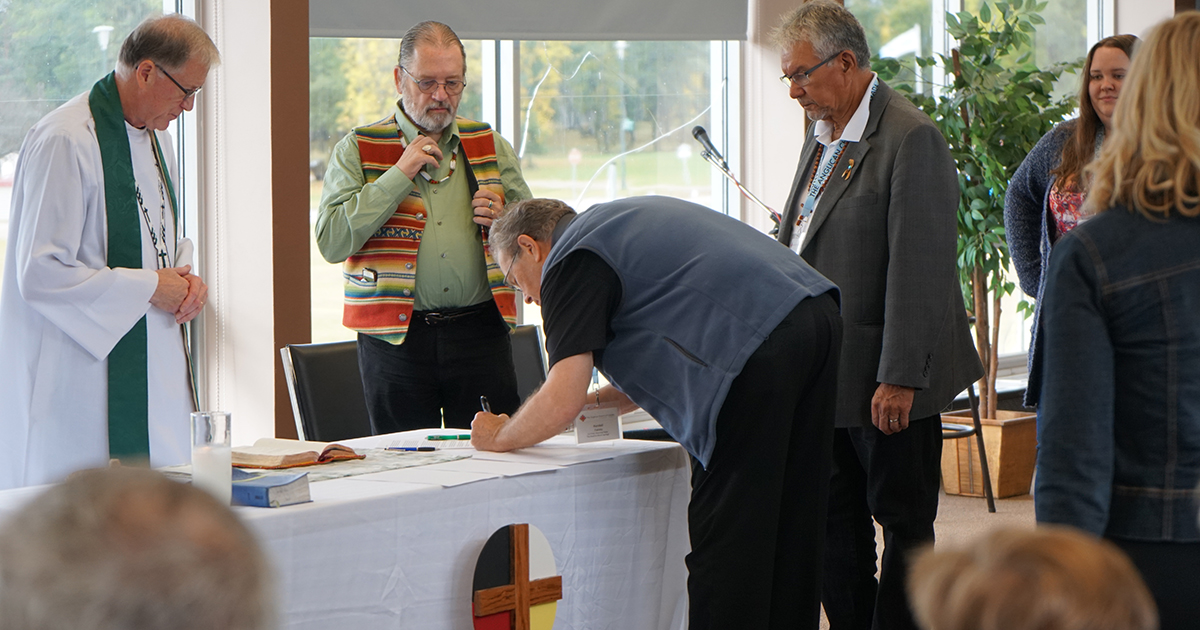The Road to Warm Springs, the National Consultation on Indigenous Self-Determination that took place from Sept. 15-17 in Pinawa, Manitoba, was another historic milestone in the journey towards a truly Indigenous church as part of the Anglican Church of Canada.
For Archbishop and Primate Fred Hiltz, the consultation was the latest step in an ongoing, decades-long process—the gradual emergence of a self-determining Indigenous church.
“I think when history is written, people will look back on this consultation as having been a holy time, and a time of renewed hope in the commitment of the whole church to really affirm the desire for a self-determining Indigenous church, and to celebrate its continual emerging,” the Primate said.
That ongoing development has been marked by events of national significance, such as the appointment of Bishop Mark MacDonald as the National Indigenous Anglican Bishop, the adoption of Canon XXII, the national Indigenous Ministries, and the enshrining of Sacred Circle and Anglican Council of Indigenous Peoples (ACIP) within the structures of the church, as well as more local expressions of self-determination.
Even so, The Road to Warm Springs marked a new level of commitment by Anglicans to make the goal of an Indigenous church a reality.
“This is a gathering of Indigenous and non-Indigenous people agreeing that self-determination is an urgent priority for the church,” Bishop MacDonald said. “That’s a very significant event.”
Renewal of the Covenant
In all, 68 people attended the consultation in Pinawa, a number that included 39 Indigenous and 29 non-Indigenous participants. Those in attendance included bishops, clergy, laity, and General Synod staff support. Co-chairs Dr. Randall Fairey (non-Indigenous) and the Rev. Norm Wesley (Indigenous) took the lead in organizing the event.
Perhaps the most symbolic element of the occasion was the renewal of the 1994 Covenant, as expressed in the Call to the Church document that emerged from the consultation.
“The 1994 Covenant was kind of the start of the journey of spiritual renewal, as it’s known in the national Indigenous circles,” Fairey said. “And this was a result of momentum over many years, the desire for which was to see if we could determine … what a self-determining Indigenous church would look like, and how it could be formed, and most important, [how it] would remain within the Anglican Church of Canada.”
Many who signed the Call to the Church had been present 23 years earlier for the signing of the Covenant. That historic connection did not go unnoticed by those attending the consultation, including Archbishop Hiltz.
“It was very moving at the closing Eucharist to see people who had signed the 1994 Covenant in that room and coming forward with tears in their eyes to sign this call to renew our commitment to the covenant, to get on with this without hesitation or further delay—the church to stand in solidarity with Indigenous peoples’ desire to be self-determining,” the Primate said.
“A very profound, emotional time for them … I think they felt like they were finally being heard, and I think that was a good thing.”
Indigenous spirituality and a new apology
A major highlight of the consultation was a presentation by well-known counselor Dr. Martin Brokenleg, an Anglican Divinity School graduate and retired Vancouver School of Theology professor, who discussed the complex nature of Indigenous spirituality as defined by the intersection between traditional and Christian beliefs.
Using the example of the Lakota people, Brokenleg described a “multiplicity” of spiritualities among Indigenous people, ranging from those who exclusively practice traditional Indigenous beliefs (a very small proportion of the total, approximating one per cent), to those who practice a mixture of traditional and Christian influences, to those—often elders—who want nothing to do with the old ways and who practice a type of fundamentalist Christianity.
“Part of the problem was that they were taught that the old ways were evil, were pagan, were wrong, from the missionaries,” Fairey said. “I think the healing that’s going to be needed in the church is particularly helping the elders understand that we now believe the missionaries were wrong. And where that goes, it will be up to Fred.”
His reference to the Primate pertains to a point raised by the Rev. Norm Wesley about the confusion faced by many Indigenous communities whose elders were once taught by missionaries that they could not practice their traditional spirituality—but who now encounter a contemporary Anglican Church of Canada that has endorsed the pairing of traditional Indigenous teachings with Christian teachings, along with the use of pipes, smudging, drumming, and dancing in worship.
Wesley called for some kind of apology on the part of the church, acknowledging wrongdoing in teaching Indigenous people that their spirituality and sacred ceremonies were “evil”, and expressing sorrow for the demand that artifacts associated with traditional ceremonies be destroyed.
In his closing remarks, Archbishop Hiltz made clear that that call did not go unheard—and that he was fully prepared to make such an apology on behalf of the church.
“I don’t have any hesitation in doing that,” the Primate said. “I think it’s entirely appropriate.”
Onward to General Synod 2019
In the wake of the gathering in Pinawa, planning team members are hard at work preparing a full report on the consultation.

The experience of The Road to Warm Springs will be a major topic of discussion at upcoming meetings of the House of Bishops, ACIP, and at the next meeting of the Council of General Synod (CoGS) in November. Following the next Anglican Indigenous Sacred Circle, a small joint working group representing Sacred Circle and CoGS is expected to prepare a report and motion that will go before General Synod in 2019.
Archbishop Hiltz noted that 2019 will mark the 25th anniversary of the signing of the Covenant—an anniversary that he hopes the church will honour in an impactful way.
“That synod could be quite a moment,” the Primate said. “Twenty-five years after the Covenant, what is it that we’re going to be affirming and celebrating? My hope, as I said at the end of the consultation, is that a truly Indigenous church will be celebrated by the whole church. And I think that there’s every possibility that by 2019, we’ll have the major pieces in place to be able to celebrate that.
“The building of a truly Indigenous church is not unlike the building of the church through time,” he added. “There’s never a moment when you can say ‘It’s done’ … because the church in many respects is not of our own doing. The church is ultimately built and takes shape as we allow ourselves to be shaped in the name of God.”
The Road to Warm Springs web page continues to be populated with videos and foundational documents from the gathering for all members of the Church.
Interested in keeping up-to-date on news, opinion, events and resources from the Anglican Church of Canada? Sign up for our email alerts .

